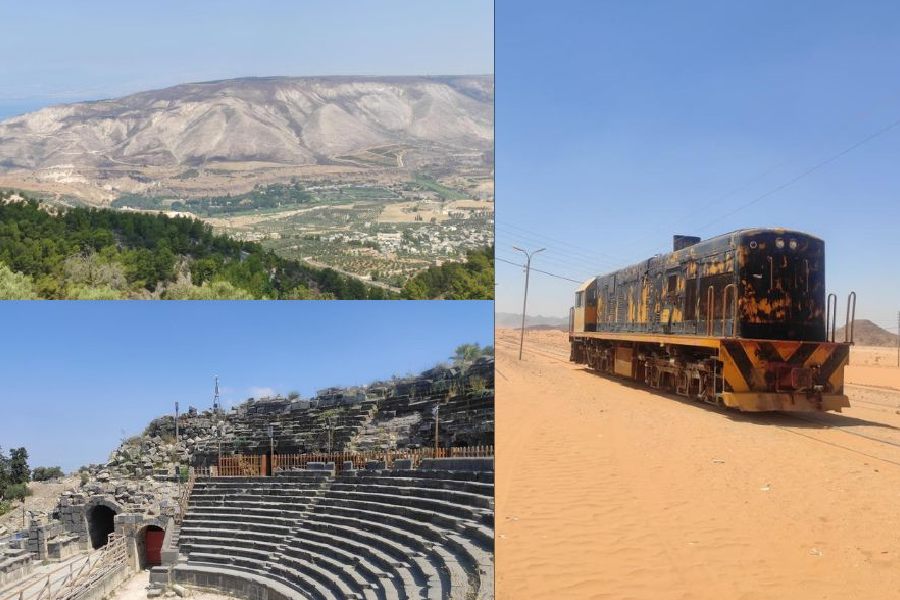The arrival lounge of Queen Alia International Airport in Jordan’s Amman filled up with passengers coming in from Egypt. Within half an hour it was empty. We, a tourist couple, soon found ourselves quite alone.
After collecting our baggage, we approached a security personnel to ask how to reach our hotel. That is when we realised a tall, wiry man was following us around.
“Hotel? Hotel?” he asked. When we asked him the fare, he quoted a figure close to what the security person had told us. So we decided to go with him.
He took us to the parking lot and pointed to an old and battered Ford. We were wondering if the luggage would fit, when he, very agitatedly, pulled up a picture of a brand new car on his phone and said in broken English that we would eventually ride in that car. Of course, we didn’t believe him. But for about 30 minutes, he pleaded with us to trust him.
We gave in. As we drove out, a cop stopped us. The driver stuffed some cash in his hand and we were off.
Life-size pictures of the king and prince of the royal kingdom of Jordan stared down at us as the car coursed down the highway. After a couple of minutes, we stopped in front of a gleaming white Toyota. Within minutes we were ensconced in the plush car with comfortable air-conditioning. “Business bad, police make it more bad,” said the cabbie, by way of explanation. “Business bad since war,” he added. Obviously, the policeman would have demanded a higher cut had the cabbie parked his car at the airport.
Everyone connected to tourism seemed to be feeling the pinch of the ongoing war over Gaza.
American and European tourists were avoiding the region because of the instability. According to local media reports, most of those who visited after the war broke out did so only because their tours booked before the war had not been refunded. We belonged to that category.
The Hashemite kingdom of Jordan is in the Southern Levant region of West Asia. It is bordered by Syria in the north, Iraq in the east, Saudi Arabia to the south and Israel and occupied Palestinian territories to the west.
Aday tour to the northern town of Umm Qais, close to which lies the ruins of ancient Gadara, a Greek centre of culture from the Hellenistic and Roman periods, brought us to the extreme northwest border of Jordan. “Every part of Jordan is peaceful, no need to worry,” assured a tour operator. The two-hour drive from Amman to Umm Qais led us to the border of Jordan, Syria and Israel with the Sea of Galilee out in the distance. After a quick query and scan of passport and visa, we were allowed into a vantage spot from where the distant lands looked deceptively calm. Green plantations of Israel to the left, the blue of the sea beyond, the mountains in front, Syria beyond…
It was fun to have the site all to ourselves — posing at the Cardo Maximus ruins, peering over the display at the museum, and finding our way to the ancient aqua duct.
Ahmad Omar Nairat, a Palestinian immigrant in Jordan was our driver-cum-guide for the day. His grandfather Mahmoud Nairat had migrated to Jordan in 1967 from Jenin in the Israel-occupied West Bank. “It’s a city surrounded by Israel,” said Nairat. Mahmoud used to sell shoes and shirts in Amman for a living. His son, a second-generation immigrant, Omar Nairat worked in the tourism sector. Nairat had three children, two of whom went to university. Ahmad took after his father and works in the tourism sector.
Said Ahmad, “There is no oil or gas in Jordan; the country relies on Iraq and Saudi Arabia for its oil and on Egypt for gas. The economy relies on tourism and vegetable exports. Tourism is seasonal and dependent on the geo-political situation.”
On Rainbow Street, Amman’s posh touristy locality dotted with shops, bars and eateries, revellers are out for a good time on a Monday evening. Shops brim with curios, eateries are all lit up, music permeates the air, and the narrow streets are filled with vehicles. There is no indication of any distress or hardship. But once you step inside the shops, you will discover that the shopkeepers are insistent, almost pleading.
On the drive to Wadi Rum or the Valley of the Moon, we stopped at a defunct railway station with an old steam engine on display. A rail line runs through Jordan and Saudi Arabia, and nearby is the city of Aqaba. The mayor of Aqaba who was visiting the railway station, came up to us and asked if we would be visiting Aqaba, the only port city of Jordan.
At Petra, which has archaeological remains of the lost kingdom of the Nabateans dating back to 300 BC, our tour guide Wali took us through the Al Siq, a gorge that opens into the ruins. At 10am on a weekday, the Siq was relatively empty. Wali stopped at various places to point to entrances to the ancient rock-cut tombs and temples. “For us, BC means before Corona,” he laughed and whipped out his phone to show a picture of the Siq jam-packed with tourists.
And then came the war.
At the Roman ruins at Jerash in Jordan, a little boy ran beside us. “Look, look, there is a donkey to take you to the Artemis temple,” he said. We refused. “Will you buy a lamp, or maybe a magnet,” he asked. We tried to ignore his requests and moved on.
After an hour when we came out, tired, we found him skipping towards us, a lamp in hand, waiting for the tourist genie.











